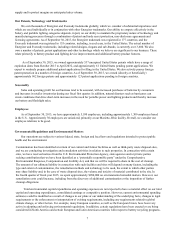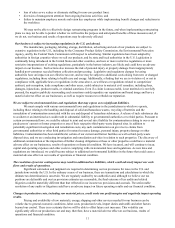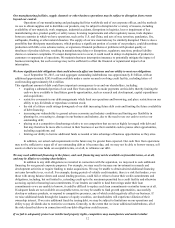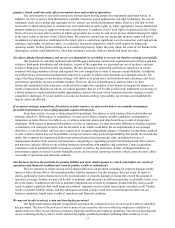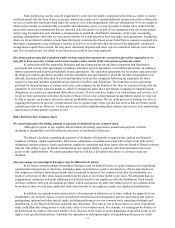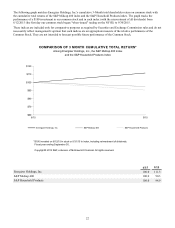Energizer 2015 Annual Report Download - page 21
Download and view the complete annual report
Please find page 21 of the 2015 Energizer annual report below. You can navigate through the pages in the report by either clicking on the pages listed below, or by using the keyword search tool below to find specific information within the annual report.17
Some parties may use the consent requirement to seek more favorable contractual terms from us, which we expect
would primarily take the form of price increases, which may require us to expend additional resources in order to obtain the
services or assets previously provided under the contract, or to seek arrangements with new third parties. If we are unable to
obtain such consents on commercially reasonable and satisfactory terms, we may be unable to obtain some of the benefits,
assets and contractual commitments that are intended to be allocated to us as part of our separation from our former parent,
and we may be required to seek alternative arrangements to obtain the distribution, wholesale, retail, legal, accounting,
auditing, administrative and other services and assets that we would otherwise have had under such agreements. In addition,
where we do not intend to obtain consent from third-party counterparties based on our belief that no consent is required, the
third-party counterparties may challenge a transfer of assets to us on the basis that the terms of the applicable commercial
arrangements require their consent. We may incur substantial litigation and other costs in connection with any such claims
and, if we do not prevail, our ability to use these assets could be adversely impacted.
Our former parent may fail to perform under various transaction agreements executed as part of the separation or we
may fail to have necessary systems and services in place when certain of the transaction agreements expire.
In connection with the separation, Energizer and our former parent entered into a separation and distribution
agreement and various other agreements, including a transition services agreement, a tax matters agreement, an employee
matters agreement and reciprocal trademark license agreements. The separation agreement, the tax matters agreement and
the employee matters agreement, together with the documents and agreements by which the internal reorganization was
effected, determined the allocation of assets and liabilities between the companies following the separation for those
respective areas and included indemnifications related to liabilities and obligations. The transition services agreement
provided for the performance of certain services by each company for the benefit of the other for a period of time after the
separation. If our former parent is unable to satisfy its obligations under these agreements, including its indemnification
obligations, we could incur operational difficulties or losses. If we do not have in place our own systems and services, or if
we do not have agreements with other providers of these services once certain transaction agreements expire, we may not
be able to operate our business effectively and our profitability may decline. We are in the process of creating our own, or
engaging third parties to provide, systems and services to replace many of the systems and services that our former parent
currently provides to us. However, we may not be successful in implementing these systems and services or in transitioning
data from our former parent's systems to ours.
Risks Related to Our Common Stock
We cannot guarantee the timing, amount or payment of dividends on our common stock.
Although we expect to pay regular cash dividends, the timing, declaration, amount and payment of future
dividends to shareholders will fall within the discretion of our Board of Directors.
The Board’s decisions regarding the payment of dividends will depend on many factors, such as our financial
condition, earnings, capital requirements, debt service obligations, covenants associated with certain of our debt service
obligations, industry practice, legal requirements, regulatory constraints and other factors that our Board of Directors deems
relevant. Our ability to pay dividends will depend on our ongoing ability to generate cash from operations and on our
access to the capital markets. We cannot guarantee that we will pay a dividend in the future or continue to pay any
dividend.
Your percentage of ownership in Energizer may be diluted in the future.
In the future, your percentage ownership in Energizer may be diluted because of equity issuances for acquisitions,
capital market transactions or otherwise, including equity awards that we grant to our directors, officers and employees.
Our employees will have stock-based awards that correspond to shares of our common stock after the distribution as a
result of conversion of their stock-based awards from the stock of our former parent to our stock. We anticipate that our
compensation committee will grant additional stock-based awards to our employees after the distribution. Such awards
will have a dilutive effect on our earnings per share, which could adversely affect the market price of our common stock.
From time to time, we will issue additional stock-based awards to our employees under our employee benefits plans.
In addition, our amended and restated articles of incorporation authorizes us to issue, without the approval of our
shareholders, one or more classes or series of preferred stock having such designation, powers, preferences and relative,
participating, optional and other special rights, including preferences over our common stock respecting dividends and
distributions, as our Board of Directors generally may determine. The terms of one or more classes or series of preferred
stock could dilute the voting power or reduce the value of our common stock. For example, we could grant the holders of
preferred stock the right to elect some number of our directors in all events or on the happening of specified events or the
right to veto specified transactions. Similarly, the repurchase or redemption rights or liquidation preferences we could


